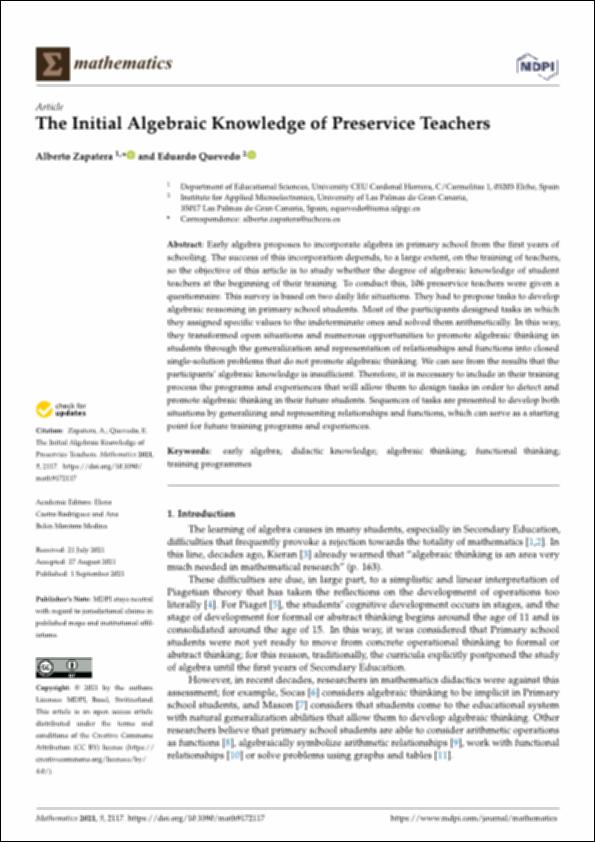Please use this identifier to cite or link to this item:
http://hdl.handle.net/10637/13643The initial algebraic knowledge of preservice teachers
| Title: | The initial algebraic knowledge of preservice teachers |
| Authors : | Zapatera Llinares, Alberto Quevedo Gutiérrez, Eduardo |
| Keywords: | Mathematics teachers - Occupational training.; Matemáticas - Didáctica - Enseñanza primaria.; Mathematics - Study and teaching - Education (Primary); Primary school teachers - Occupational training.; Álgebra - Didáctica - Enseñanza primaria.; Algebra - Study and teaching - Education (Primary); Profesores de enseñanza primaria - Formación profesional.; Profesores de matemáticas - Formación profesional. |
| Publisher: | MDPI |
| Citation: | Zapatera, A. & Quevedo, E. (2021). The initial algebraic knowledge of preservice teachers. Mathematics, vol. 9, i. 17 (01 sep.), art. 2117. DOI: http://dx.doi.org/10.3390/math9172117 |
| Abstract: | Early algebra proposes to incorporate algebra in primary school from the first years of schooling. The success of this incorporation depends, to a large extent, on the training of teachers, so the objective of this article is to study whether the degree of algebraic knowledge of student teachers at the beginning of their training. To conduct this, 106 preservice teachers were given a questionnaire. This survey is based on two daily life situations. They had to propose tasks to develop algebraic reasoning in primary school students. Most of the participants designed tasks in which they assigned specific values to the indeterminate ones and solved them arithmetically. In this way, they transformed open situations and numerous opportunities to promote algebraic thinking in students through the generalization and representation of relationships and functions into closed single-solution problems that do not promote algebraic thinking. We can see from the results that the participants’ algebraic knowledge is insufficient. Therefore, it is necessary to include in their training process the programs and experiences that will allow them to design tasks in order to detect and promote algebraic thinking in their future students. Sequences of tasks are presented to develop both situations by generalizing and representing relationships and functions, which can serve as a starting point for future training programs and experiences. |
| Description: | Este artículo se encuentra disponible en la siguiente URL: https://www.mdpi.com/2227-7390/9/17/2117 Este artículo pertenece al número especial "Research on Teaching and Learning Mathematics in Early Years and Teacher Training". |
| URI: | http://hdl.handle.net/10637/13643 |
| Rights : | http://creativecommons.org/licenses/by/4.0/deed.es |
| ISSN: | 2227-7390 (Electrónico) |
| Issue Date: | 1-Sep-2021 |
| Center : | Universidad Cardenal Herrera-CEU |
| Appears in Collections: | Dpto. Ciencias de la Educación |
Items in DSpace are protected by copyright, with all rights reserved, unless otherwise indicated.


